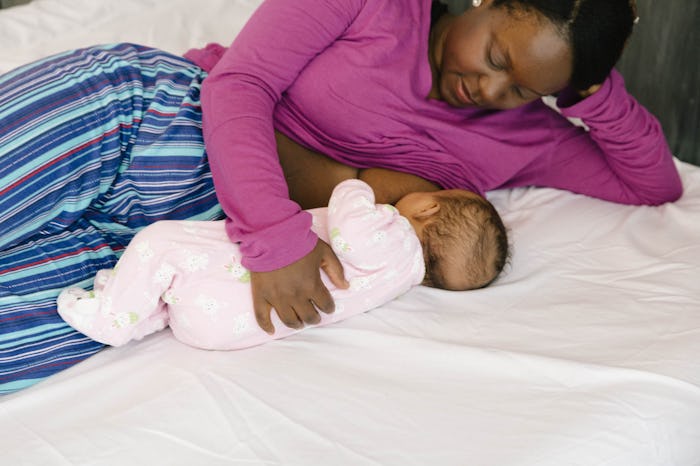Life
6 Reasons Why Breastfed Babies Sleep Better, According To Science
Every parent knows that when it comes to babies, sleep time can be a struggle. Whether it’s from reflux, a sleep regression, or the fact that they're just light sleepers, some babies seem to have a lot of trouble falling or staying asleep. If you have been breastfeeding, you may have had it a little easier. In fact, there are several reasons why breastfed babies sleep better, according to science, including the special ingredients that are found in your breast milk.
I nursed both of my children for two years each, and I know that breastsleeping — when you sleep and nurse simultaneously in bed — saved me and my babies from the horror of sleepless nights. I found that when they would nurse cozied up next to me, they would sleep better, and so would I. At the time I didn’t think about the biology behind it — I just did it because it was easier. Turns out, that there is actually some science behind this magic.
It’s important to note that there are no definitive studies to prove that overall, breastfed babies sleep better than formula fed babies. However, there are elements of breastfeeding and breast milk that can help babies sleep better. Here are just a few of the nighttime and nap time benefits of nursing.
1Your Breastmilk Is Easy On The Tummy
It is well known that in most cases, breast milk is easier on a baby’s stomach than formula. According to Baby Center, breast milk contains more whey than protein, which makes it easy for your baby to digest and reduces the potential for extra gas or reflux that can wake your baby from their sleep. When your baby’s tummy is calm, their sleep can be restful, too.
2Your Baby Is Getting Chemicals That Make Them Sleepy
There are studies that show that when you nurse at night, your breast milk can actually change in composition throughout the day, and even contain more sleep inducing hormones at night, according to New Scientist. Their research showed that the milk your body produces in the evening has higher amounts of chemicals linked to sleepiness called nucleotides. So when you nurse in the evening, your baby is getting a lot of these sleep-inducing nucleotides, helping them to sleep better at night.
3Breast milk Has Hormones That Make Your Baby Feel Full
Believe it or not, there are a number of hormones that are released when you breastfeed. International Board Certified Lactation Consultant (IBCLC) Danielle Downs Spradlin tells Romper that when your baby sucks, a hormone called cholecystokinin is produced, which helps the baby feel sleepy. The cholecystokinin found in breast milk can also help a baby feel fuller, reported Breastfeeding Today, which results in less hunger pangs and more restful sleep.
4Breast milk Has Sleep-Inducing Hormones and Amino Acids
Babies don't begin to produce their own melatonin, an important sleep hormone, until they are a few months old explains Spradlin, but they can get it through your breastmilk. A study in the European Journal of Pediatrics found that concentrations of melatonin found in breast milk, which are higher at night, can decrease the chances of colic and improve the quality of sleep in breastfed babies. Evening breast milk even has higher levels of tryptophan and serotonin too, noted to Psychology Today, which aid in the development of sleep-wake cycles.
5Skin to Skin Breastfeeding Keeps Your Baby Calm And Comfy
When you nurse at the breast, the skin-to-skin contact can be relaxing for your baby. IBCLC Angie Natero tells Romper that skin-to-skin action can help keep your baby’s temperature, heart rate, and breathing more stable. It can also release the “love hormone” oxytocin in the mother, which IBCLC Tori Sproat says helps bond and build trust between both baby and mom. The skin-to-skin time you get when breastfeeding can calm your baby, making them feel safe and secure, while helping them to sleep more comfortably.
6Breastsleeping Can Lead To More Sleep
IBCLC Tera Kelley Hamann tells Romper that moms and babies who breastsleep tend to get better sleep than those who don't. Along with getting continuous skin-to-skin time, your baby will have your breast available whenever they get hungry, so they don’t end up crying themselves awake. However, lactation consultants caution that there are certain safety measures you should take when breastsleeping including sleeping on flat firm mattress (no water beds) free of extra pillows, blankets, or soft toys, or other children. And to further avoid the risk of SIDS, you should try to keep baby unswaddled and on their back when they sleep.
For me, breastsleeping came out of sheer exhaustion. I was getting out of bed to check on my baby every time she tossed, turned, or made a squeak, and by morning I felt like a certified zombie. I was so tired one night, that I lay down in my bed with my baby on my breast, and fell asleep. We both slept through the entire night, and from then onward, breastsleeping became my go-to nighttime routine.
Check out Romper's new video series, Bearing The Motherload, where disagreeing parents from different sides of an issue sit down with a mediator and talk about how to support (and not judge) each other’s parenting perspectives. New episodes air Mondays on Facebook.
